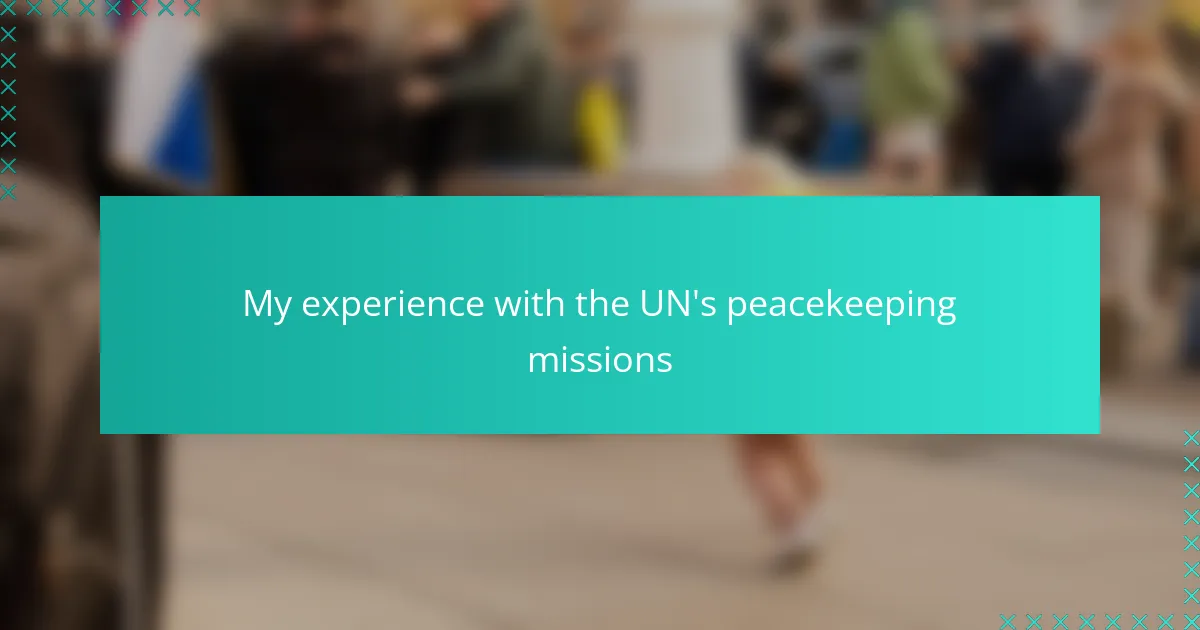Key takeaways
- UN peacekeeping missions require a delicate balance of neutrality, consent, and multidimensional cooperation among diverse stakeholders, emphasizing the importance of diplomacy and trust.
- Challenges include navigating the complexities of local factions, ensuring the safety of peacekeepers, and maintaining impartiality in polarized environments.
- Effective peacekeeping relies on patience, flexibility, and genuine human connection, highlighting that small gestures can significantly build trust.
- Lessons from peacekeeping can inform global politics by advocating for empathy, adaptability, and a deeper understanding of the human elements behind conflicts.
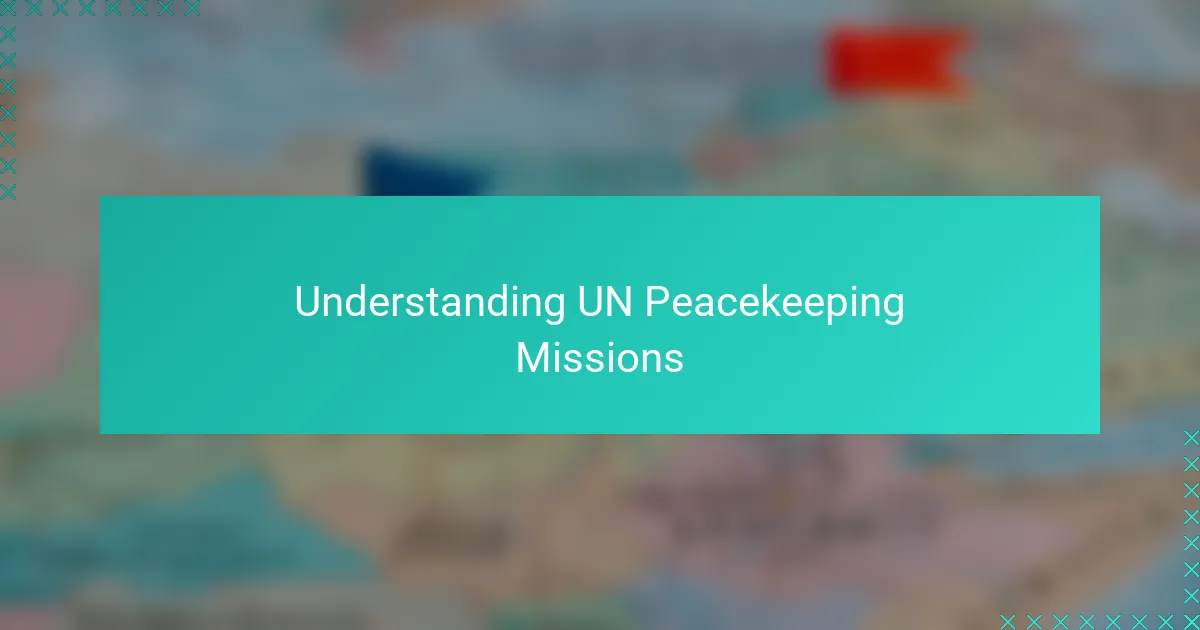
Understanding UN Peacekeeping Missions
UN peacekeeping missions are complex operations designed to maintain peace and security in conflict zones. When I first encountered UN peacekeepers on the ground, I was struck by their neutrality — they are neither an army nor a police force, but a unique blend committed to protecting civilians and supporting political processes. Have you ever wondered how these missions balance diplomacy with sometimes dangerous fieldwork?
From my experience, the concept of “consent of the parties” is crucial yet fragile. Peacekeepers must navigate delicate relationships between conflicting groups, ensuring that all sides agree to their presence. This delicate balance often felt like walking a tightrope, where one misstep could escalate tensions rather than calm them.
What truly resonated with me was the mission’s multidimensional nature. Beyond soldiers, peacekeeping teams include police, human rights experts, and humanitarian workers, all striving to rebuild trust and institutions. Witnessing these efforts, I realized peacekeeping is not just about stopping violence but about laying the groundwork for lasting peace.
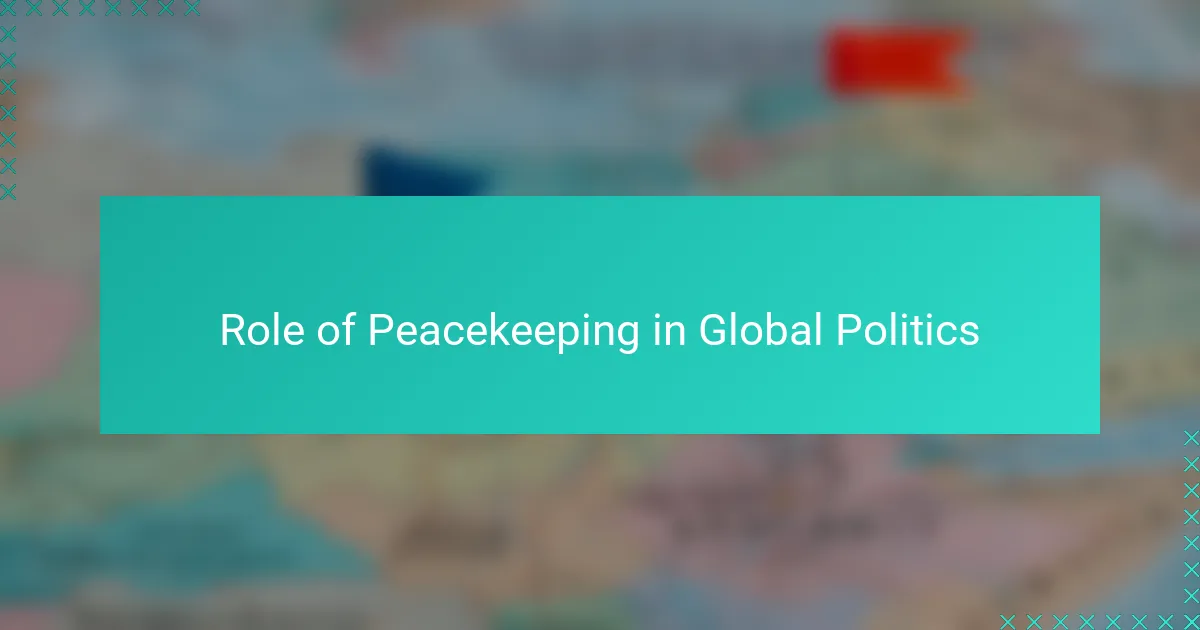
Role of Peacekeeping in Global Politics
Peacekeeping plays a subtle yet powerful role in global politics by serving as a living example of international cooperation. During my time with the mission, I saw how peacekeepers acted as both stabilizers and mediators, filling gaps where diplomatic efforts alone often fell short. It made me wonder—how many conflicts might spiral further without their steady presence on the ground?
The political impact of peacekeeping extends beyond immediate conflict zones. I noticed that these missions often become symbols of global commitment to peace, influencing negotiations and power dynamics far from the battlefield. Observing this, I realized that peacekeeping is as much about shaping perceptions and building trust between nations as it is about physical security.
Sometimes, peacekeeping feels like an imperfect but vital experiment in global governance. From my perspective, the biggest challenge is maintaining neutrality in a deeply polarized world—a task that requires resilience and constant adaptation. Have you considered how this delicate neutrality might actually be the strongest political statement peacekeepers make?
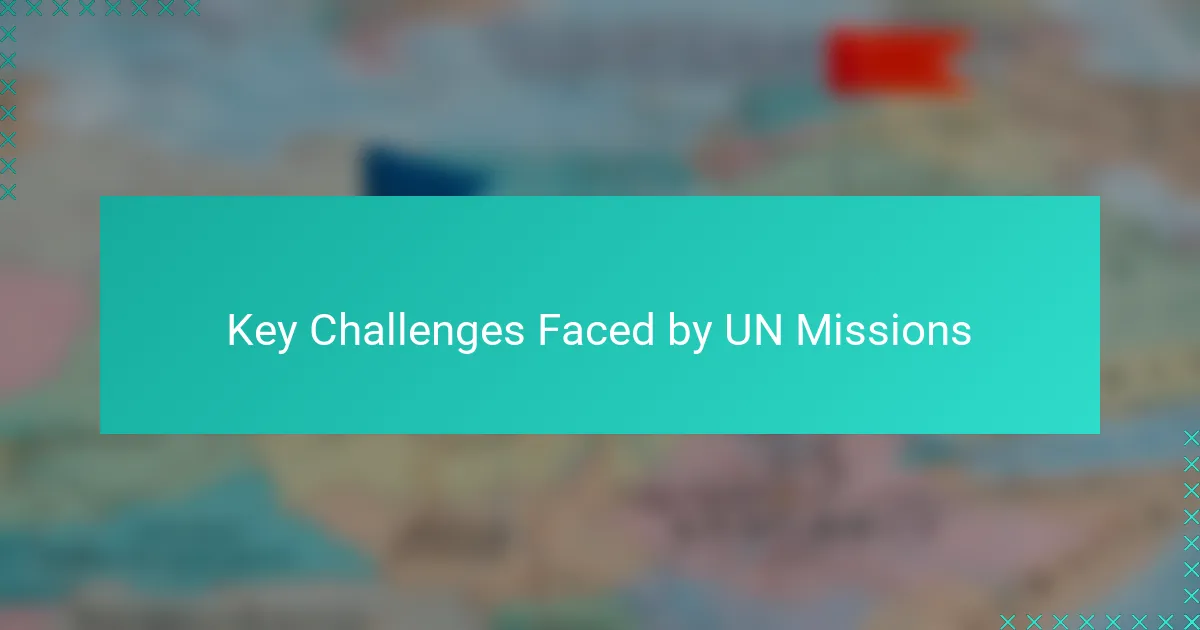
Key Challenges Faced by UN Missions
One of the toughest challenges I noticed was the sheer complexity of coordinating multiple stakeholders, from troop-contributing countries to local factions. At times, it felt like trying to conduct an orchestra with players who spoke different languages and had varying expectations. Have you ever tried mediating between groups that fundamentally distrust each other? It’s exhausting and requires relentless patience.
Another hurdle was the ever-present risk to peacekeepers themselves. I remember moments when the calm on the surface could shatter in seconds, reminding me how vulnerable these missions are despite their noble goals. Facing threats, sometimes from the very people they aim to protect, added a deeply human dimension to their struggle that numbers and briefings never capture.
Then there’s the political tightrope peacekeepers walk daily. I often reflected on how their neutrality is constantly tested by external pressures and shifting alliances. How do you stay impartial when the very actors involved expect you to take sides? In my view, maintaining this balance demanded not just professionalism but profound courage and integrity.
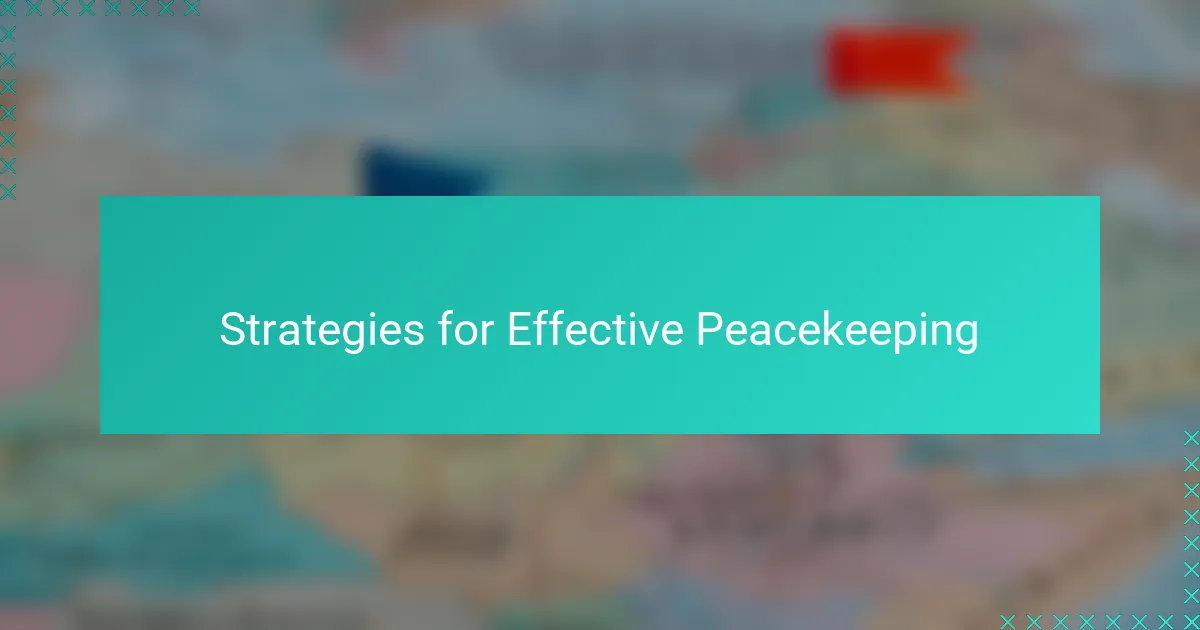
Strategies for Effective Peacekeeping
Effective peacekeeping, in my experience, hinges on building genuine trust with all parties involved. I recall a tense negotiation where simply listening earnestly to each side helped defuse hostility more than any enforcement of rules. Could it be that sometimes, peacekeepers’ greatest weapon is patience and empathy rather than physical presence?
Another strategy I found crucial was flexibility. Missions often faced unpredictable changes—from sudden clashes to political shifts—and rigid plans quickly became obsolete. Being able to adapt on the ground, reshaping approaches without losing sight of core objectives, often meant the difference between escalating conflict and calming it.
Lastly, coordination stood out as a cornerstone. Integrating military, police, and civilian efforts wasn’t just a logistical challenge; it required constant communication and mutual respect across cultures and expertise. I’ve witnessed how small breakdowns in teamwork could jeopardize entire operations, which convinced me that effective peacekeeping is really about cultivating collaboration on every level.
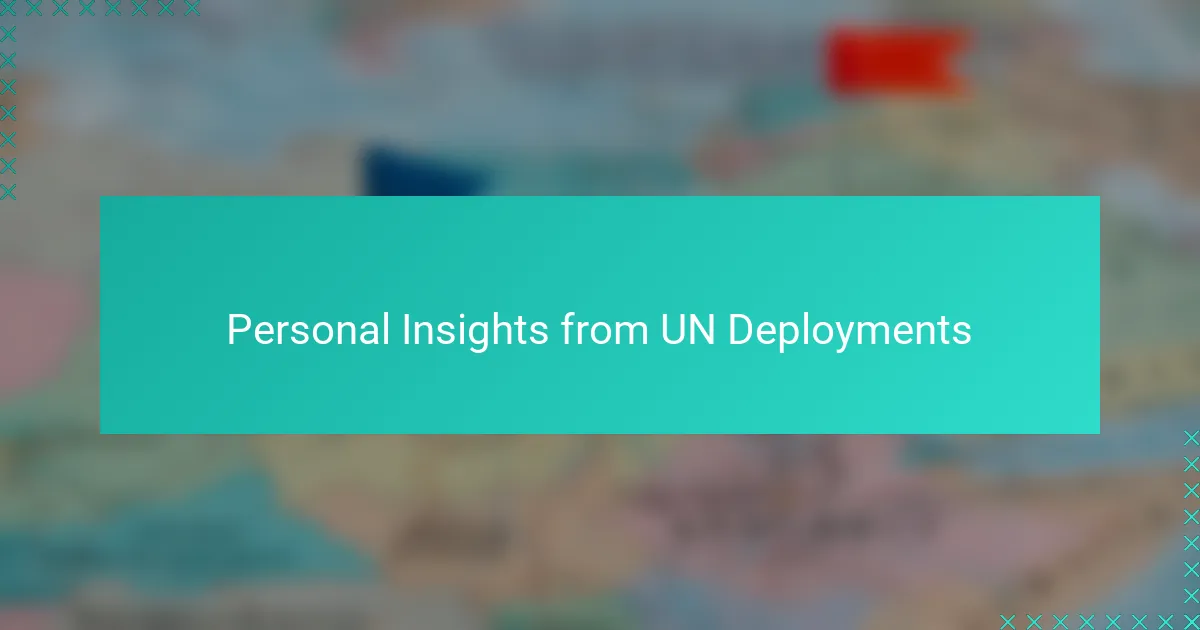
Personal Insights from UN Deployments
Being on the ground with UN peacekeepers gave me a firsthand look at the emotional weight they carry. I remember the exhaustion in their eyes after long patrols, yet I saw a deep commitment that never wavered. Have you ever wondered what drives people to stay calm and hopeful amid chaos? For many, it’s the belief that their presence, no matter how small, can change lives.
One moment that stays with me was witnessing a local community slowly open up after months of distrust toward outsiders. It struck me how peacekeeping isn’t just about enforcing rules but about human connection—building bridges where walls once stood. This taught me that peace is fragile and personal, crafted step by step through empathy and presence.
Sometimes, I questioned how peacekeepers cope with the silence that follows violence—the pause that feels heavier than any gunfire. In those quiet moments, I understood that peacekeeping demands not just action but patience and resilience. It’s a lesson in endurance that goes far beyond the battlefield.
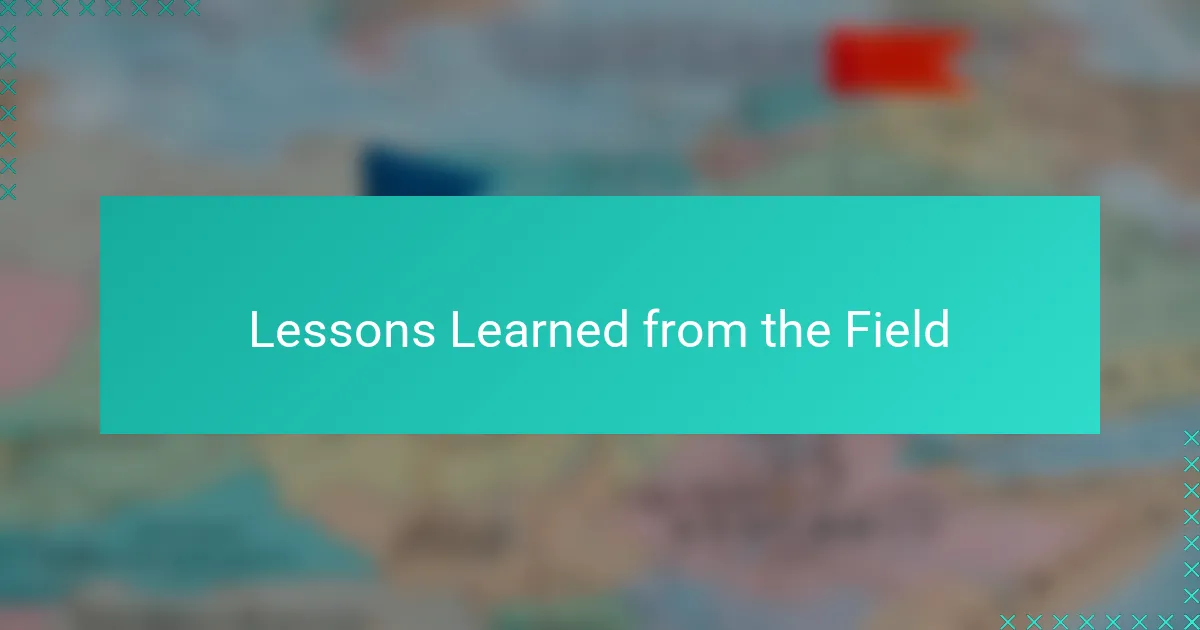
Lessons Learned from the Field
One lesson that struck me deeply was how unpredictable the field can be. Plans crafted months in advance often unraveled within hours, teaching me that rigidity is a luxury peacekeepers cannot afford. Have you ever experienced a moment when flexibility wasn’t just helpful but necessary for survival? This reality forced me to rethink the value of adaptability—not just in strategy but in mindset.
Another insight came from witnessing the power of small gestures. I recall a simple act where a peacekeeper shared a meal with a wary local leader. That moment of shared humanity did more to build trust than any official negotiation. It made me realize that at the core of peacekeeping lies personal connection—something numbers and mandates can never fully capture.
Lastly, I learned that patience isn’t just a virtue; it’s a survival skill in these missions. Conflict zones rarely offer quick fixes, and the slow progress often felt frustrating. Yet, watching relationships and institutions rebuild little by little showed me that enduring peace is a marathon, not a sprint. Have you ever felt that sometimes the hardest work is simply waiting and believing that change is possible?
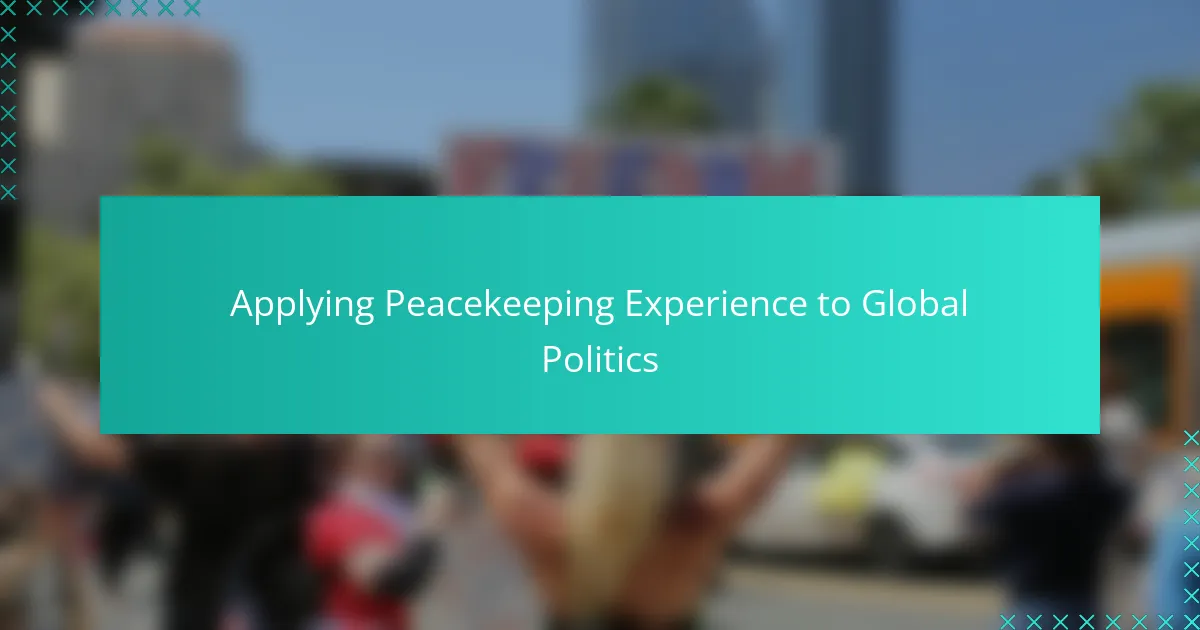
Applying Peacekeeping Experience to Global Politics
Applying my peacekeeping experience to global politics has taught me that practical, on-the-ground insights reveal the realities behind abstract diplomatic discussions. I often reflected on how the patience and nuanced understanding required in the field could inform broader political strategies, reminding me that sustainable solutions need time and empathy, not just immediate resolutions.
One striking realization was how the neutrality and impartiality peacekeepers strive for can serve as a powerful model for international relations. In a world often driven by competing interests, maintaining this balance felt less like weakness and more like a deliberate political stance—one that advocates for dialogue over domination. Have you considered how this approach might reshape our expectations of global leadership?
From my perspective, applying peacekeeping lessons means acknowledging complexity without oversimplifying conflicts. It’s easy to view international politics as chess moves, but peacekeeping showed me the human dimension behind every decision—something that demands flexibility, humility, and a commitment to listening. This mindset, I believe, could transform diplomatic efforts from zero-sum games into collaborative paths toward peace.
